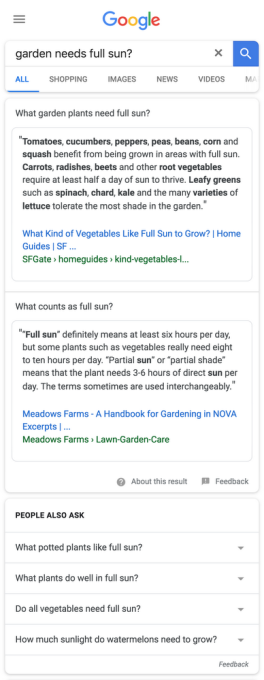
For years, Google’s “featured snippets” have offered quick answers to users’ search queries by pulling information from web pages and placing it in a box above the search results. This week, Google began rolling out a new snippet experience for web searchers with multiple answers to the question posed in the search box – something that addresses the problem of Google not always understanding the intent behind your query.
As the company explains in a blog post, there are some questions that can be interpreted in different ways. For example, the query “garden needs full sun?” could mean the searcher was asking “what garden plants need full sun?” or “what counts as full sun?” Google’s multifaceted featured snippets, as the new feature is called, will answer both questions with one snippet placed above the other, ahead of the search results.
At launch, the feature is only focused on search queries that could be interpreted in different ways. For example, “tooth pain after a filling” could mean the searcher wants to know why it’s hurting, or how long it will hurt.

But Google says the plan is to expand these multifaceted feature snippets to cover even more query types over time, including to guidance-seeking queries. A query of this type means the web searcher is looking for an answer to a question where many factors could come into play. One example would be, “is it worth fixing my foundation?.” As Google explains, the web searcher may need answers about cost, duration of the project, how the work is performed, and financing costs. This information is also going to be served up in multiple snippets in the future.
Google says it will continue to experiment with snippets over the course of the year, in order to expand coverage.
Of course, snippets haven’t always proved to contain helpful answers. Earlier this year, Google had to tweak the feature to stop serving up wrong and biased answers, after reports emerged about how often snippets featured “improbable or laughably incorrect” information. Some snippets had said things like “women are evil” or Obama was planning a coup, Google admitted when detailing how it was fixing the problem.
The company said it had failed to weigh the authoritativeness of results strongly enough for rare and fringe queries, and often served near-matches in snippets when it didn’t have information available, which made the snippet’s answer look wrong. It addressed both those issues with changes to its search quality rating system, and improvements to how snippets worked. At the time, Google also announced its plans to launch these multi-faceted snippets sometime “soon.”
With the change to snippets, Google is hoping to not make the same mistake of featuring incorrect information. It says if you see a result that you have feedback on (perhaps another wrong or biased answer), you should submit it through the feedback link on the search results page.




